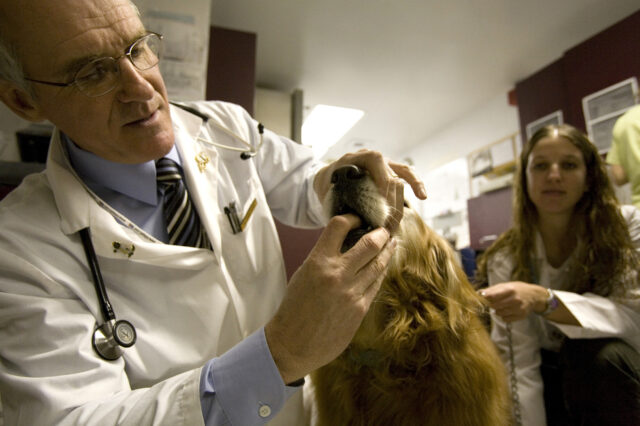UF veterinarians seek dogs with melanoma to participate in new vaccine study

Rowan Milner, chief of the University of Florida Veterinary Medical Center’s oncology service, inspects a cancerous lesion in the mouth of a golden retriever participating in a melanoma vaccine trial (Photo by Sarah Kiewel/University of Florida)
University of Florida veterinarians are seeking dogs with melanoma to participate in an ongoing study of a new vaccine designed to fight the spread of the common skin cancer. "We are currently looking at the effect of this vaccine in dogs that have the disease in all stages, from the least severe to the most advanced, said Rowan Milner, D.V.M., chief of the UF Veterinary Medical Center's oncology service. "The vaccine we have developed stimulates the natural killer cells in the body that act almost like Pac-men to destroy the tumors." Last year Milner and his UF colleagues published information about their study, one of three canine melanoma vaccine studies currently under way in the United States, in Veterinary Immunology and Immunopathology. The other two studies are at the Animal Medical Center in New York and at the University of Wisconsin in Madison, Milner said. On March 26, the U.S. Department of Agriculture approved a conditional license for a canine melanoma therapeutic vaccine to Merial. The product licensed was that tested in the AMC study, Milner said. "All three vaccine studies are different and all want to achieve the same thing: to harness the dog's immune system to fight the spread of melanoma," Milner said. "At this stage, we cannot say which one of these vaccines being studied is the best. There is a broad front of research, and once we find out which one is really going to work, the others may fall by the wayside, or we may find that each vaccine targets specific subgroups of melanoma. Time will tell." Melanomas are formed when the pigment-producing cells of the skin known as melanocytes multiply in an uncontrolled fashion, eventually invading the tissues that surround them and, in the case of malignant melanoma, spreading to local lymph nodes and the lungs. "Only between 5 percent and 7 percent of all skin tumors in dogs are melanomas, but melanoma is the most common oral tumor in dogs, making up 6 percent of all cancer cases," Milner said, adding that UF's melanoma vaccine does not make use of gene therapy but consists of a more traditional composition aimed at stimulating an immune reaction. "The interesting thing about the reaction we get it is that it includes antibodies, but also stimulates the natural killer cells," Milner said, adding that no significant adverse reactions have been seen so far in any of the 35 dogs participating in the study. "Although most vaccines are given to prevent the onset of disease, the melanoma vaccine is actually a form of immunotherapy because it is being administered after the cancer forms rather than before," he said. Melanoma is unusual among cancers affecting dogs and people in that in some cases the body is able to recognize the disease as foreign and can develop an immune reaction to it. In humans, melanomas are associated with ultraviolet light, but this is not thought to be a risk factor in dogs. In dogs, skin tumors can appear anywhere on the body, but are most frequently seen in the nail beds, in the eye and in the mouth, where they are the most aggressive and malignant, veterinarians say. Oral melanomas are most commonly seen in highly pigmented breeds such as chow chows, German shepherds, poodles and schnauzers. Signs that indicate oral melanoma might be present include growths appearing in the dog's mouth, bad breath and drooling. Veterinarians typically treat melanoma-afflicted dogs with surgery to remove the tumor, followed by radiation of the primary site. The biggest threat to a dog's survival, however, comes if and when the tumor spreads to the lymph nodes, then to the lungs. "In most cases, surgeons can remove the cancer if it's small enough, but in high-grade tumors there is a big risk that the tumor will spread to the lungs, eventually causing the lungs to fail," Milner said. Milner said the melanoma vaccine would never be a replacement for surgery or radiation, because the local disease still has to be treated. "The vaccine is really there to suppress the spread of the disease," he said. The UF study will accept 60 cases. Participating dogs will be followed for up to two to three years as part of the study protocols. "Melanoma does not respond well to chemotherapy, the gold standard for trying to control metastasis of many other cancers," Milner said. "There are other cancers that chemotherapy works well for, but in my experience, chemo is not very effective in preventing spread of the melanoma. While not a panacea for all problems, immunotherapy will have its place." Anyone seeking more information about the melanoma vaccine study should contact UF's Veterinary Medical Center at 352-392-4700, ext. 4700.